Nation of Islam

The National Museum of African American History and Culture, set to open Sept. 24, tells many stories of African-Americans of diverse faiths who have shaped U.S. history. Close to 10 percent of the 2,586 artifacts in its inaugural exhibitions are related to faith and religious history.
Rex Ellis, associate director for curatorial affairs, said the museum is essentially an intersection of uplift, spirituality and resilience.
“There is no way you can discuss, talk about or understand the African-American journey without understanding the very real role faith played in its history,” said Ellis, an ordained Baptist minister.
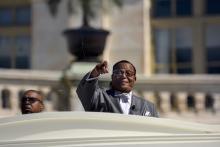
Facing throngs of people on the National Mall, Nation of Islam Minister Louis Farrakhan called for justice Oct. 10 as he rallied African-Americans, Latinos, and others during an anniversary protest at the U.S. Capitol.
In a speech that lasted more than two hours, Farrakhan said the United States was hypocritical for insisting other nations were violating human rights, all the while describing its own misconduct as something that causes Americans “dissatisfaction.”
His “Justice or Else!” event came 20 years after hundreds of thousands of black men came to the same stretch of lawn between the Capitol and the Washington Monument to rededicate themselves to being better fathers, sons, and citizens.
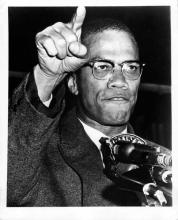
Rodnell Collins stood next to his uncle, Malcolm X, as the latter stared thoughtfully at Plymouth Rock during a visit to Massachusetts when Collins was a child.
It wasn’t until years later that Collins, the son of Malcolm’s sister, Ella Little Collins, would learn what his uncle was thinking: “We didn’t land on Plymouth Rock. The rock was landed on us.”
Malcolm X, the African-American nationalist leader and onetime minister of the Nation of Islam who was assassinated 50 years ago Feb. 21, inspired countless people with the frank and uncompromising way he spoke about race relations in America. And much of what he said about the experiences of black Americans remains true today, experts say.
Yet, while other civil rights leaders of the 1950s and ’60s are more broadly celebrated as American heroes, the fire with which Malcolm X spoke still overpowers the words he was saying.
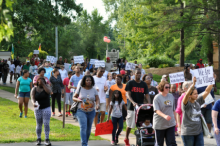
FERGUSON, Mo. — Ever since Michael Brown, a young, unarmed African-American, was shot by a police officer on Aug. 9, various crews have played a part in achieving the tentative peace that has taken hold of the St. Louis suburb once rocked by protests.
Some wear black T-shirts with large white letters that spell out “Peacekeepers.” Others dress in bright orange shirts and call themselves “Clergy United.” All acknowledge that the Nation of Islam has been a key player since the very beginning.
Last week, Capt. Ronald S. Johnson of the Missouri Highway Patrol, who took over the police security patrol in Ferguson, acknowledged on national television that the Nation of Islam and other groups — such as Black Lawyers for Justice — helped control the crowds on West Florissant Avenue. Others on social media pointed out that the Nation of Islam protected businesses from looters.
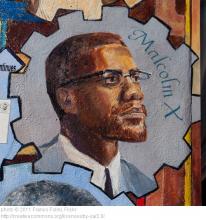
Sitting in his hotel room in Saudi Arabia in April 1964, civil rights activist Malcolm X penned a letter on hotel stationery to his friend and co-author, Alex Haley.
Malcolm X had just left the controversial Nation of Islam, a group whose leader denounced whites as “devils.” In Saudi Arabia, he completed the hajj pilgrimage to Mecca, where the experience of eating and drinking with “fellow Muslims whose skin was the whitest of white” had changed his mind on race, he told Haley.
“What I have seen and experienced on this pilgrimage has forced me to ‘rearrange’ much of my thought patterns and to toss aside some of my previous conclusions,” he wrote.
Ten months later, Malcolm X was assassinated in New York City.
The letter – considered by many historians to capture a watershed moment in Malcolm X’s life and philosophy, became part of “The Autobiography of Malcolm X,” which Haley co-wrote and Grove Press published in 1965. Four years later, Grove’s owner agreed to give his company’s files – including the letter from Saudi Arabia — to Syracuse University, where they sit today on the sixth floor of Bird Library.
Now, Haley’s son wants that letter back.
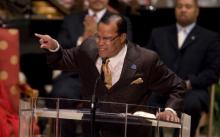
Jewish leaders on Monday denounced Nation of Islam leader Louis Farrakhan after he delivered a four-hour speech on Sunday that was laced with anti-Semitic statements about Jewish control of the media.
Speaking to thousands of supporters during the 82nd annual Saviors' Day celebration in Chicago, Farrakhan accused "Zionists" of trying to push America into war with Iran and dubbed Al-Jazeera, the Dubai-based news channel, as "Al Jew-zeera."
"I'm not anti-Semitic, I'm just telling the truth," Farrakhan asserted, alleging that Jews were responsible for a controversial 2008 cover of The New Yorker that depicted President Obama in Muslim garb.